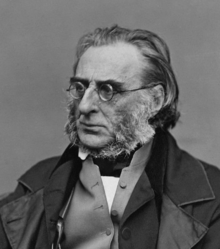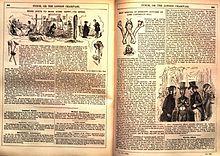Charles James Napier
Sir Charles James Napier , GCB (born August 10, 1782 in London , † August 29, 1853 in Oakland) was a British general , commander in chief of the troops of the British East India Company .
Charles Napier was the eldest son of Colonel The Hon. George Napier, Auditor of Ireland, and Lady Sarah Lennox, daughter of Charles Lennox, 2nd Duke of Richmond . His brother was George Thomas Napier . Charles James Napier was born in Whitehall on August 10, 1782 and received his first education from his father in Ireland. In 1794 he joined the British Army on foot as an ensign of the 22nd regiment , before he was 12 years old. He experienced his first active military service with the Irish Rebellion of 1798 and the uprising of 1803. In 1806, after having received his own company, he went to Spain. In the battle of La Coruña , in which he was wounded five times and was taken prisoner of war, he commanded the 50th regiment on foot.
In May 1813 he took over command of a brigade that consisted partly of his own regiment, but also of French prisoners of war . In 1815 he entered Paris with the Allied troops .
From 1823 to 1825 he supported the Greek freedom fighters in their struggle against the foreign rule of the Ottomans and for an independent Greek republic . In 1837 he was appointed major general and command of the troops in the northern counties of England.
In June 1841 Napier took command in India , where he led a campaign to conquer Sindh in 1843 . In 1849 he became commander in chief of the troops of the British East India Company , but did not get to lead them in the Second Sikh War .
In 1851 Napier returned to the United Kingdom, where he died in Oakland near Portsmouth in 1853 .
The city of Napier in New Zealand is named after him and a bronze statue of Napier stands in Trafalgar Square , London. A park is named after him in the town of Argostoli on the island of Kefalonia .
Peccavi
Major General Charles James Napier is said to have telegraphed the conquest of Sindh to London in 1843 with the one word "Peccavi" . What is certain is that the newly founded magazine Punch published the following text on May 18, 1844:
"It is a common idea that the most laconic military despatch ever issued was that sent by Caesar to the Horse-Guards at Rome, containing the three memorable words" Veni, Vidi, Vici "and, perhaps, until our own day, no like instance of brevity has been found. The despatch of Sir CHARLES NAPIER, after the capture of Scinde, to Lord Ellenborough, both for brevity and thruth, is, however, far beyond it. the despatch consisted of one emphatic word - " Peccavi, " "I have Scinde," ( sinned ) "
“It is a common thought that the most laconic military dispatch ever abandoned was that sent by Caesar to the Guard Cavalry in Rome, containing the three memorable words Veni, Vidi, Vici and, perhaps, did not become a similar example of brevity up to our day found. Sir Charles Napier's despatch to Lord Ellenborough after the conquest of Sindh goes far beyond this in brevity and honesty. The despatch consisted of the emphatic word " Peccavi " "I have Sindh," ( sinned ) “[The Latin verb peccavi means I have sinned in English , equivalent to I have Sindh .]
The pun referred not only to the conquest of Sindh, but also to Napier's orders not to conquer Sindh. One possible originator of the pun in the satirical magazine Punch is Catherine Winkworth .
literature
- Byron Farwell: Queen Victoria's Little Wars. Wordsworth Editions Limited, Ware 1999, ISBN 1-84022-216-6 .
- Mark Lemon , Henry Mayhew (Eds.): Punch. Volume VI, ISSN 0033-4278 , 1844.
Web links
Individual evidence
- ^ Byron Farwell: Queen Victoria's Little Wars, Wordsworth Editions Limited, Hertfordshire 1999. Page 30.
- ↑ Mark Lemon / Henry Mayhew (eds.): Punch or the London Charivari. London 1844. Volume VI. Page 207.
- ↑ 'Peccavi'
| personal data | |
|---|---|
| SURNAME | Napier, Charles James |
| BRIEF DESCRIPTION | British general, commander in chief of the troops of the British East India Company |
| DATE OF BIRTH | August 10, 1782 |
| PLACE OF BIRTH | London |
| DATE OF DEATH | August 29, 1853 |
| Place of death | Oakland |

